English
Español
Greetings friends of Hive and community of Insects of the world
Saludos amigos de Hive y comunidad de Insects of the world
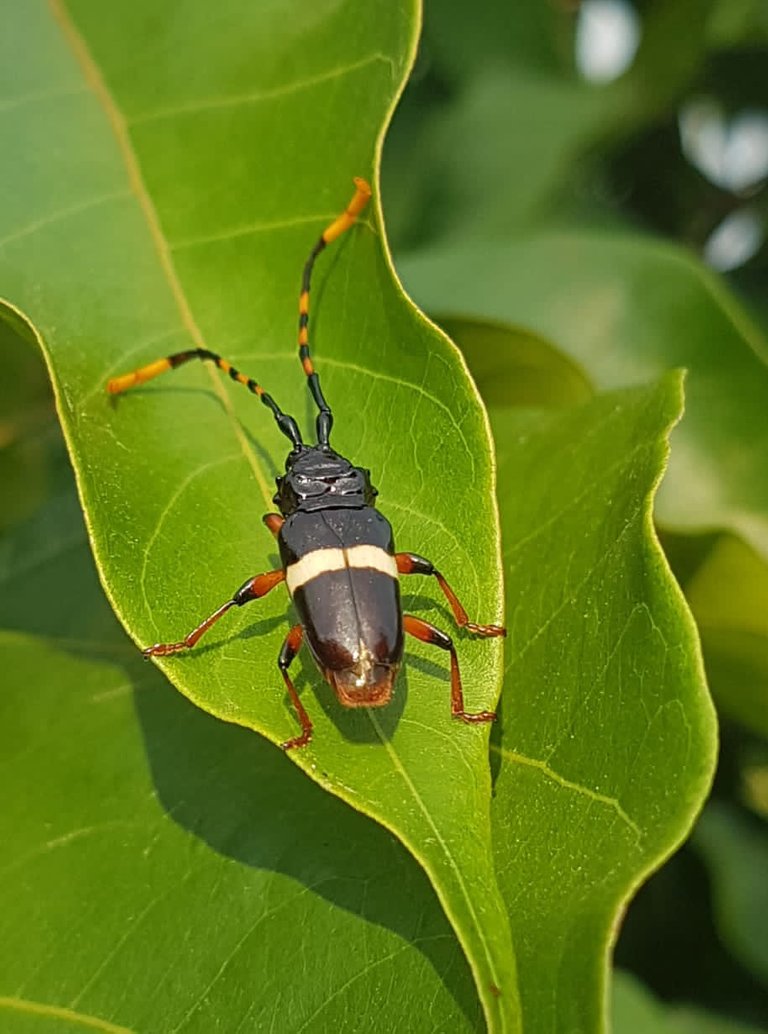
A few days ago a beetle that I did not know perched for a long time on one of the leaves of the annatto tree (Bixa orellana), it seemed to be sunning.
Hace días un escarabajo que no conocía se posó largo rato sobre una de las hojas del árbol de onoto (Bixa orellana), parecía estar asoleandose.
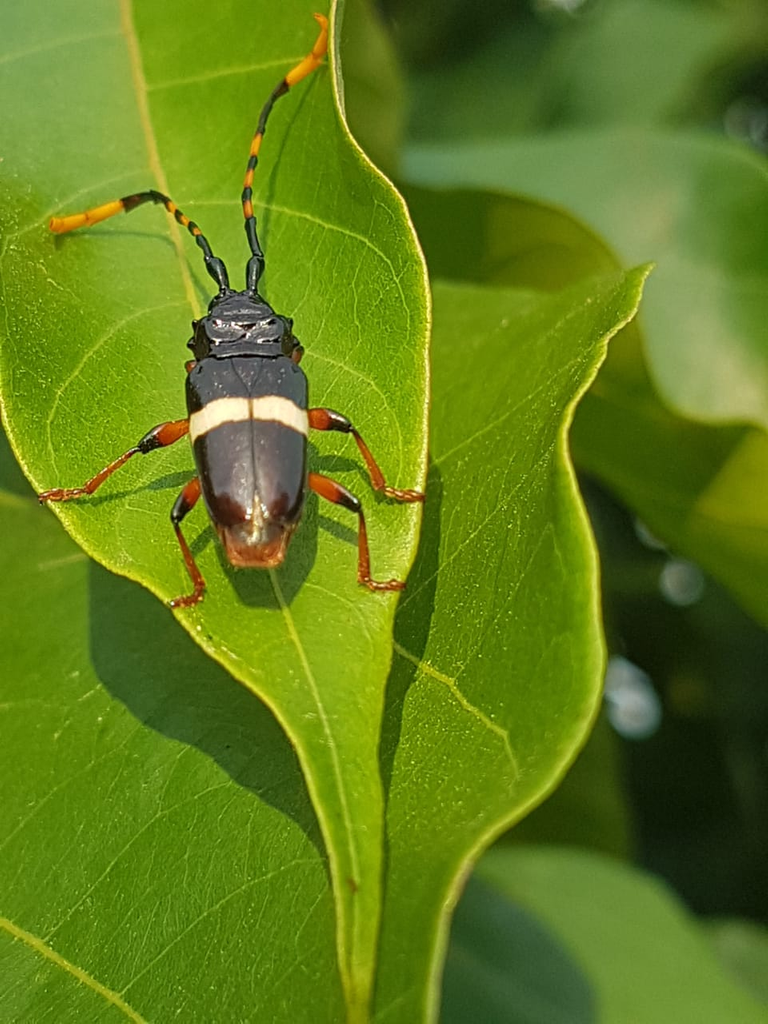
It did not move or fly away as we approached. However, @darioreuben only took 7 photos with his Samsung smartphone and sent them to me on Whatsapp.
No se movió ni salió volando al acercamos. Sin embargo, @darioreuben solo tomó 7 fotos con su teléfono inteligente Samsung y me las envio por Whatsapp.
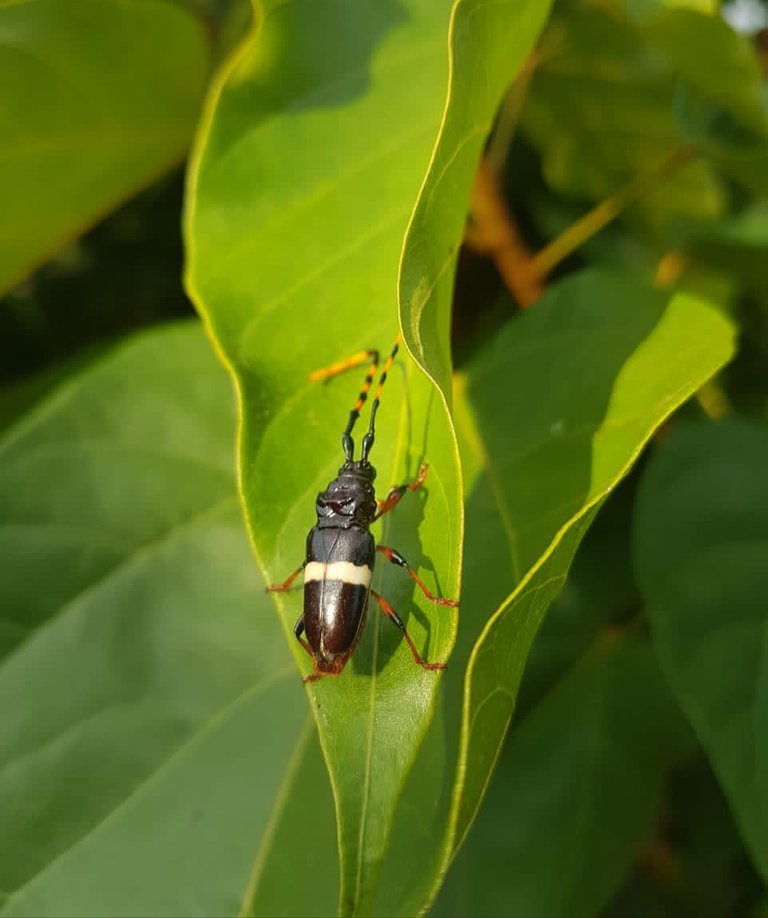
I was able to identify it quickly, thanks to the Google lens application.
This is Dendrobias mandibularis, a beetle from the
Cerambycidae family that groups the so-called "long-horned beetles".
Logré la identificación de manera rápida, gracias a la aplicación Google lens.
Se trata de Dendrobias mandibularis, escarabajo de la familia
Cerambycidae que agrupa a los llamados "escarabajos de cuernos largos".

It is also called Trachyderes mandibularis and the name of the species comes from the large size of the jaw in males.
También es llamado Trachyderes mandibularis y el nombre de la especie viene del gran tamaño que tiene la mandíbula en los machos.
In Mexico it is called orange tree borer or torito.
En México es llamado barrenador del naranjo o torito.
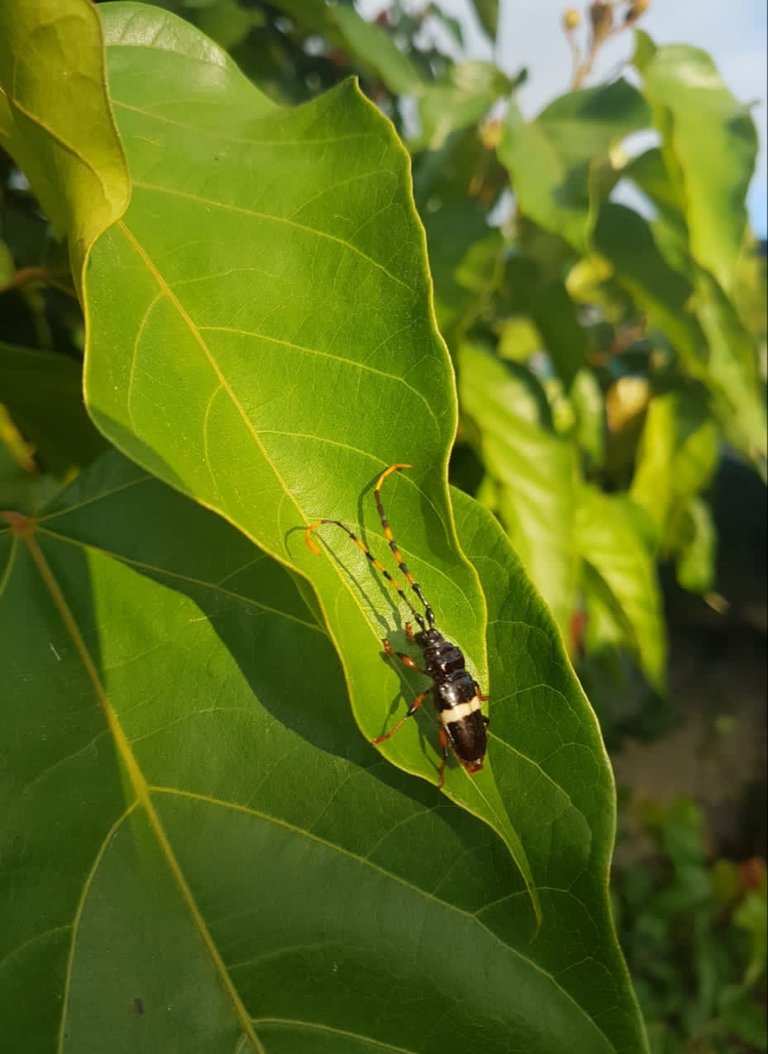
It has a dark brown body, head, and wings with white bands across both wings, long antennae of alternating brown and yellow colors, and reddish-brown legs with dark bands. It measures approximately 20 millimeters.
Tiene el cuerpo, cabeza y alas de color marrón oscuro con bandas blancas atravesando ambas alas , largas antenas de colores marrón y amarillo alternados, y patas marrón rojizo con bandas oscuras. Mide 20 milímetros aproximadamente.
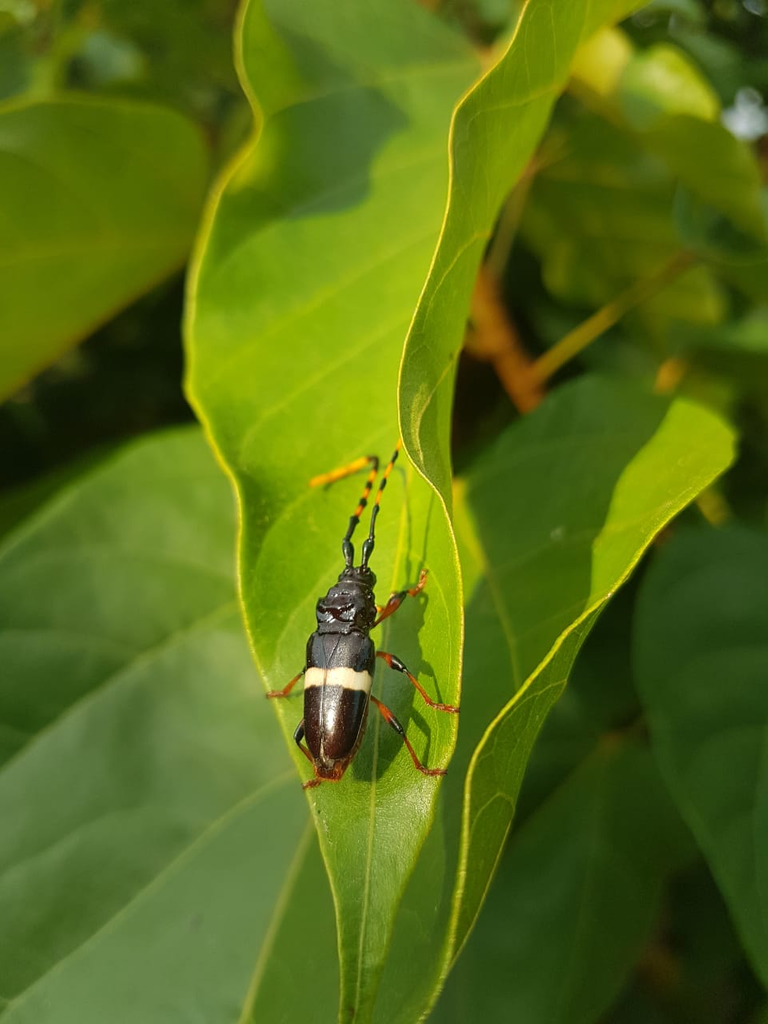
It lives from the southern United States to Central America. Its host plants are those of the genera
Parkinsonia, Salix, Celtis and Citrus.
Habita desde el sur de Estados unidos hasta América central. Sus plantas hospederas son las de los géneros
Parkinsonia, Salix, Celtis y Citrus.
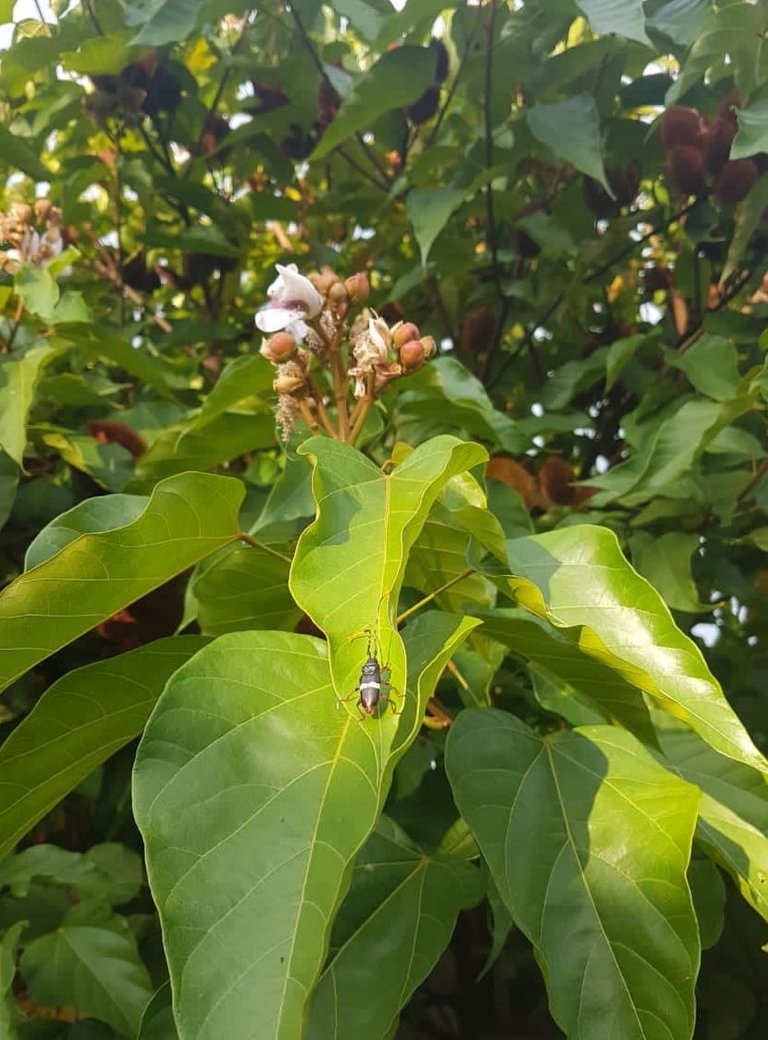
Some of the longhorned beetle species are considered invasive and pests, as their larvae feed on wood from live or fire-damaged trees. They also feed on fruit trees, fruits and untreated wood in buildings and furniture.
Algunas de las especies de escarabajos de cuernos largos son consideradas invasoras y plagas, ya que sus larvas se alimentan de madera de árboles vivos o injuriados por incendios. También se alimentan de árboles frutales, de frutos y de madera no tratada en edificios y muebles.
Longhorn beetles constitute one of the largest families of Coleoptera, with approximately 25,000 recognized species. Some can also be considered recycling agents of organic matter in forest ecosystems.
Los escarabajos longicornios constituyen una de las más grandes familias de coleópteros, con aproximadamente 25000 especies reconocidas. Algunos también puede considerarse agentes recicladores de la materia orgánica en ecosistemas forestales.
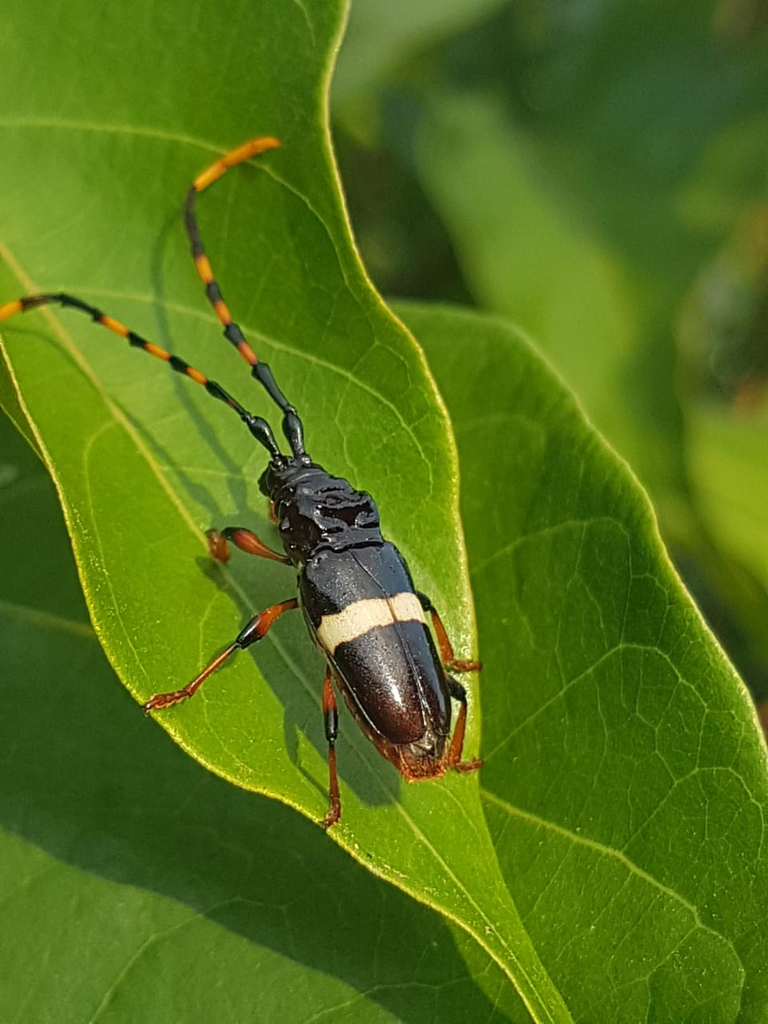
Date and place of discovery: January 23, 2023, Libertador municipality, Carabobo state, Venezuela.
Fecha y lugar del descubrimiento: 23 de enero de 2023, municipio Libertador, estado Carabobo, Venezuela.
For information gathering I used Wikipedia articles and BugGuide
Para reunión de información utilicé artículos de Wikipedia y BugGuide.
Thank you so much for stopping by and reading my post.
Muchas gracias por detenerse y leer mi publicación.


Imagen hecha con Canva y Paint.
Translated with / Traducido con: Google translator.
Dividers / Separadores
References / Referencias:
https://bugguide.net/node/view/42430
https://es.wikipedia.org/wiki/Cerambycidae
https://en.wikipedia.org/wiki/Dendrobias_mandibularis
https://arthropoda-mexicana.blogspot.com/2012/08/trachyderes-mandibularis-cerambicido.html










Su post ha sido valorado por @ramonycajal
Muchas gracias!
We appreciate your work and your post has been manually curated on behalf of Insects Of The World Community. It will be added to the weekly curation report. Keep up the good work.
Thank you very much @hive-129253!
Buen trabajo, gracias por compartir en la comunidad
We appreciate your work and your post was manually curated by @none! from the DNA team!
Reach us on Discord to learn more about the project!
Hello @elentogether!Hello @dna.org, thank you very much!